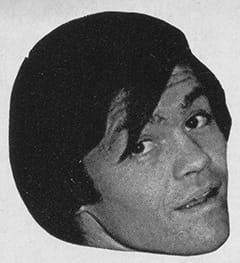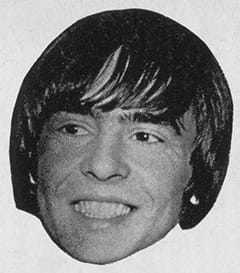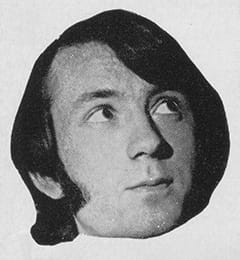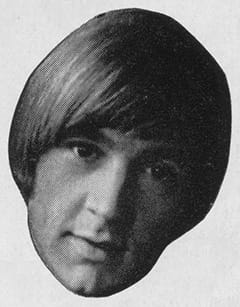Cars became important to Micky. He loved to strip them down, examine every nut and bolt, find out precisely what every part was used for. This was at least second best to having a regular job in show-business. Or SO he thought. Later it wasn’t so necessary for him to bring in money for the family, his mother and sisters, and he decided that he’d get himself some more “learning” by enrolling at Los Angeles Trade Technical College.
We’ve seen that none of the Monkees was exactly happy at school in the early days. We’ve noted that most of the time they were fighting a losing battle against bad examination results and against a fair amount of dislike shown by their class-mates. But Micky was the one who went back, having sampled the life outside. And he was very impressed…
In fact, he confessed on his last visit to London that he really would like to have one more year at a university so that he could catch up on some subjects he regretfully failed to study when he was at school. “I was lazy and my mind was on other things. But sampling things like psychology and science, things like that, made me realise how I oughta’ve learned more about other subjects when I had the chance. It’ll never happen, I know that deep inside… but if I was able to get back to school right now you’d find me the most attentive kid in class. Sometimes I think it’s a pity that you get important things thrown at you when you’re too young to even want to know”, he breaks off and goes on: “Lotsa parents slog away to get their kids through school. It’s a shame you can’t do your studying after you’ve been out in the wide world, finding out how important it is to know about things.”
Anyway, Micky worked on with great enthusiasm at his studies. The artistic side of him was always there, of course. He loved making things, painting things, writing things. He watched television and got a great kick out of going to the cinema and then re-enacting the whole production, in a variety of voices and shapes, for his mates, or his family.
But one day there was that advertisement. Show-business came back to uppermost position in Micky’s mind. He decided to go along and see what it was all about. However it being Micky, things weren’t to go in straightforward style.
About five hundred young hopefuls turned up in answer to a plea for: “Madness! Folk and Rock musicians-singers for ACTING roles in new TV series—running parts for four insane boys, aged 17–21.”
Of course we all know who were finally picked… which quartet was eventually selected to create not only the Monkees but a whole new concept on how to present pop music on television.
And, in our story of the Monkees, we’ve reached the point where Micky Dolenz had read about the audition and turned up to go through his zany paces for producers Bert Schneider and Bob Rafelson.
Told parents Permalink
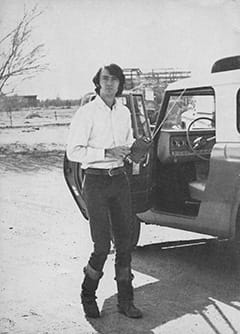
But before digging deeper into the period before the audition for Davy, Pete and Mike, let’s just picture the scene as Micky went home to tell his folks about what had actually happened. He burst into his home and said: “Now listen, you’re not gonna believe a single word of this! I’ve been to auditions but this was like nothin’ I’ve ever seen before…
“Listen, these two guys sat behind a desk and said hardly a word. So I figured it was up to me to do something. Like I started pulling crazy faces and twitching my hands about. Did a couple of impressions of movie stars… all the time looking at these guys to see if anything was registering. Maybe they’d sometimes smile a bit, but I just went on—I figured that if they wanted someone who was ‘insane’, I’d do my best to give that impression.”
His family listened in apparent disbelief. “Oh go ON, Micky,” said his mum. “They must have asked you what experience you’ve had. Did you tell them about ‘Circus Boy’?” Micky nodded, said he had tried to explain a few things but these two gents just kept on staring at him. He fooled around, in a sort of nervous desperation, with a pile of Coke bottles… “They were spread out there on a table so I moved one of them and said ‘Checkmate’… that kinda thing.”
But the outcome was predictably unusual, knowing how things almost always worked out for Micky. He didn’t hear anything about the result of the audition for quite a few weeks. He’d figured he had nothing to lose, so he didn’t worry. In the end he more or less pushed it out of his mind.
“Suddenly one day, when I was hanging around doing nothing, one of my buddies said he’d been reading about how I was due to go into a new television series. It was news to me. I asked him where he’d read it—and he said in Variety. So I got a copy and sure enough there was my name. Mind you, I rang the Variety people first of all, just to check they hadn’t goofed… then I got onto the Screen Gems offices to find out what they wanted me to do.”
And so we’ve got at least one Monkee officially involved in this revolutionary new telly-series… a production idea that was to set alight the pop charts of the world. But in this story we have to keep going back in time, keeping space available for each Monkee as he leads up to audition time.
Right now we go back to Davy. He’s still got a long way to go before the Monkees were even dreamed of by those two shrewd producers. For we left Davy working in racing stables in England, working so hard that often he felt like bursting into tears and just running off back home.
But this was also due to frustration. As we’ve seen in our exclusive series of interviews between Davy and Basil Foster, the well-known racehorse trainer who took Davy under his wing… for twenty-five bob a week!… Davy was mad-keen on horses but he also had a strong yen for acting. And the parts started coming in for Davy to take jobs on radio and, eventually, as Ena Sharples’ grandson in “Coronation Street”. What’s more, he was in the first edition of “Z-Cars”, as all fans will know…
Special interests Permalink
Nobody watched that first episode of Davy in “Coronation Street” with more interest than Basil Foster. He now says: “I realised that he really did have a great deal of talent. In a way, I felt sorry for him because he was so much in love with the horse-racing world and he used to hate asking for time off to pursue his theatrical interests. All the same, I felt more confident about his chances in the theatre than in the equally tough world of racing.”
So, in a quiet but forceful way, Basil Foster started dropping the name of David Jones whenever he met his own show-business friends. There was Charlie Drake, for instance, who often visited the Foster stables. And Colonel Bill Alexander and his son Hugh. And Reg Campbell. Again we must re-cap a little, to keep this Monkee Story full and complete.
There was a part in a touring version of “Peter Pan” going begging—in fact, the lead. Basil, for a start, felt that it would suit Davy. So again he put the word in. And Davy recalls telling his dad around this time: “Somehow I’m getting the impression that Mr. Foster is trying to get rid of me! Seriously, he’s doing a lot of work on my behalf, trying to get me involved in the theatre. Still, it’s very good of him and he keeps on telling me I can go back to the stables if I don’t get on too well at acting. He says he thinks I’ll make the grade and probably be going back to see him to BUY some horses of my own!”
Giggle Permalink
All this, Davy admits, was a bit of giggle. At school he’d failed to get a lot of decent parts in amateur theatricals because he was too small. He couldn’t, at that time, see how he’d fare any better in the adult theatre, among professionals. Anyway, he turned up for the “Peter Pan” audition AND was sent along for another hearing for the part of the Artful Dodger in “Oliver”, for a West End production of the Lionel Bart show.
In brief—no point covering ground already expanded in earlier copies of Monkees Monthly—Davy got “Peter Pan” and was given six weeks, the length of the tour, to get a reasonable Cockney accent going so that he could also play “Artful Dodger” afterwards. And it was Jane Asher, playing the girl lead in “Peter Pan” who coached him and taught him enough East End phrases for him to appear in the West End!
Davy was a big hit in both parts—as we’d all expect. His natural energy, charm and talent came over good and strong and provincial audiences lapped him up as did the swish West End folk later on. But Davy says now: “Hearing applause, say after a special song, was great but I couldn’t forget how much I wanted to be a jockey. Once or twice I managed to get time off and go to a meeting near London and meet up with some of the apprentices and I’d try to collect all the gossip from the stables.
“I remember being specially interested in one horse named Stonecrackers’… for she was the first racing horse I’d ever ridden and it was such a difference from the hacks and ponies I’d been used to that I thought I was going to get thrown off. But most of the guys I’d known at the stables thought I was mad to even think about leaving show business. Specially when I got an offer to go to America with the Broadway production of ‘Oliver’—because they felt it must be the chance of a lifetime. At that moment, though, I was sure I’d be homesick and anyway I still wasn’t sure that I was good enough to be any sort of star name in the theatre.
“The thing was this. Whenever I’d been involved in show business in Britain, I had this feeling that there were hundreds of other lads, same size as me, who were that much better as artistes. Maybe if I’d had more confidence at that time, I’d never have even thought of being a jockey again, but I felt I was getting rather more sheer luck than I deserved in getting two parts right after each other. I also felt that if that luck ran out, I’d be left high and dry—with no chance of getting back into racing.
Another great episode next month
